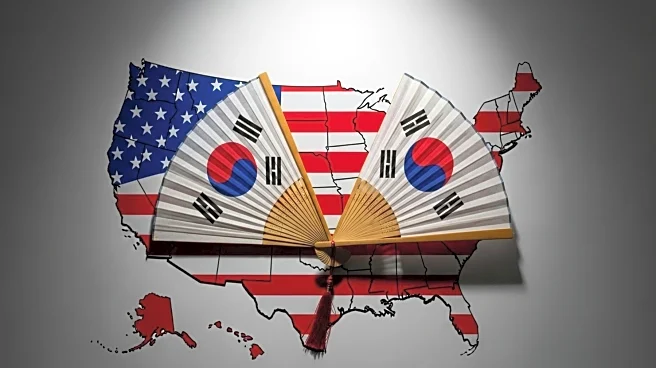What's Happening?
South Korea has expressed significant outrage following the detention of over 300 South Korean workers by U.S. Immigration and Customs Enforcement (ICE) during a raid at a Hyundai-LG battery plant construction site in Georgia. The workers, who were detained for using business visas for employment purposes, were returned to South Korea after a week-long ordeal. The incident has strained relations between the U.S. and South Korea, with South Korean officials and media criticizing the U.S. for treating the workers like 'prisoners of war.' The raid has raised concerns about the treatment of foreign workers and the visa policies affecting South Korean businesses operating in the U.S.
Why It's Important?
This incident has significant diplomatic and economic implications, potentially affecting the relationship between the U.S. and South Korea. The treatment of the workers has sparked public anger in South Korea, with calls for the U.S. to address visa issues that impact Korean businesses. The situation highlights the challenges faced by foreign companies in navigating U.S. immigration policies, which could influence future investment decisions. The diplomatic fallout may prompt discussions on revising visa policies to better accommodate the needs of international businesses and their workers.
What's Next?
South Korean officials are likely to engage in diplomatic discussions with their U.S. counterparts to address the visa and treatment issues. The incident may lead to policy reviews and potential changes in how foreign workers are managed in the U.S. The response from both governments will be crucial in determining the future of U.S.-South Korea economic and diplomatic relations. Businesses and policymakers will be watching closely to see how the situation is resolved and what measures are taken to prevent similar incidents in the future.
Beyond the Headlines
The incident underscores the broader challenges of immigration and labor policies in the U.S., particularly for foreign workers and international businesses. It raises questions about the balance between enforcing immigration laws and supporting economic partnerships with allied nations. The public and media response in South Korea reflects deeper concerns about trust and cooperation between the two countries, which could have long-term implications for bilateral relations.









